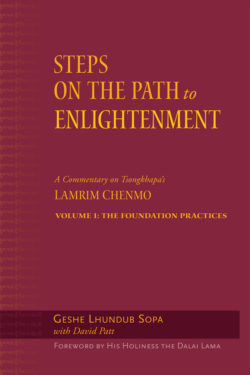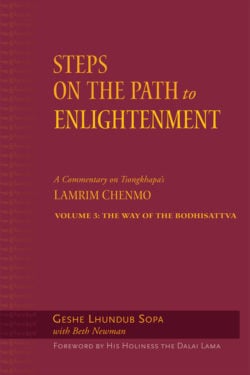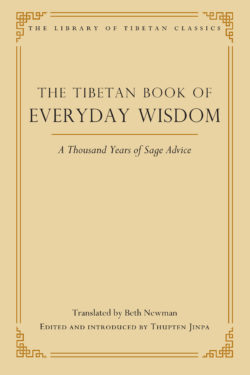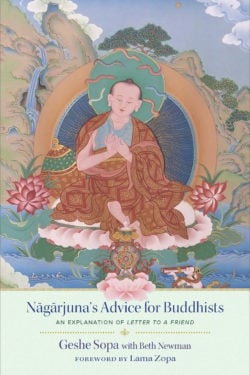Beth Newman

Beth Newman received her PhD in South Asian Languages and Literature from the University of Wisconsin-Madison. She teaches at Ringling School of Art and Design in Sarasota, Florida, and is the translator of The Tale of the Incomparable Prince.
Books, Courses & Podcasts
Steps on the Path to Enlightenment, Vol. 1
Steps on the Path to Enlightenment: The Foundation Practices marks the first volume of a much-anticipated, comprehensive commentary on the Lamrim Chenmo by the renowned Buddhist scholar, Geshe Sopa.
This landmark commentary on what is perhaps the most elegant Tibetan presentation of the Buddhist path offers a detailed overview of Buddhist philosophy, especially invaluable to those wanting to enact the wisdom of the Buddha in their lives.
In the Lamrim Chenmo, Tsongkhapa explains the path in terms of the three levels of practitioners: those of small capacity who seek happiness in future lives, those of medium capacity who seek liberation from the cycle of suffering, and those of great capacity who seek full enlightenment in order to benefit all beings. This volume covers the topics common to the first level: Tsongkhapa’s explanations of the role of the teacher, his exhortation to take the essence of human existence, the contemplation of death and future lives, and going for the refuge.
Given his vast knowledge and his experience in both Tibetan and Western contexts, Geshe Sopa is the ideal commentator of this work for the modern student of Tibetan Buddhism.
Read Tsongkhapa’s biography at the Treasury of Lives.
Steps on the Path to Enlightenment, Vol. 3
Geshe Lhundub Sopa’s Steps on the Path to Enlightenment is a landmark commentary on what is perhaps the most elaborate and elegant Tibetan presentation of the Buddhist path, Tsongkhapa’s monumental Lamrim Chenmo. In this third volume of five, readers are acquainted with the bodhisattva’s path and the altruistic desire to make service to others the driving force of spiritual development.
It begins with an explanation of what distinguishes the Mahayana practitioner from other Buddhists and goes on to describe the nature of bodhichitta. Geshe Sopa then provides a detailed commentary on the two methods to develop this awakening attitude: the techniques of sevenfold cause-and-effect and exchanging self and other.
While bodhichitta’s significance in Mahayana Buddhism is universally known, Geshe Sopa illustrates how bodhichitta can motivate a devoted practitioner toward complete enlightenment and how this is accomplished through the performance of the bodhisattva perfections. Whether engaged in a scholarly study or personal practice of the Lamrim Chenmo, Geshe Sopa’s guiding voice leads readers to a deeper understanding and appreciation of the bodhisattva way.
The Tibetan Book of Everyday Wisdom
The Tibetan Book of Everyday Wisdom: A Thousand Years of Sage Advice presents a genre of Tibetan works known as “wise sayings” (lekshé). While most Tibetan literature focuses on the Buddhist path, wise sayings literature has traditionally been a centerpiece of secular education in Tibet and in the cultivation of social mores and an honorable way of life. Drawing inspiration from classical Indian literature on human virtue and governance (nitisastra), including the folktales in the Pañcatantra, the authors of these Tibetan works strove to educate young minds in the ways of the civilized world, especially by distinguishing the conduct of the wise from that of the foolish.
This anthology includes some of the best-loved classics of Tibetan literature, such as Sakya Pandita’s Jewel Treasury of Wise Sayings, Panchen Sönam Drakpa’s Ganden Wise Sayings, and Gungthang’s Treatise on Trees and Treatise on Water. The final work is the intriguing Kaché Phalu’s Advice. Ostensibly written by a wise Tibetan Muslim, this versified text enjoys great popularity within Tibetan-speaking communities, such that many Tibetans are able to recite at least a few verses from memory.
Learn more about the Library of Tibetan Classics
Learn about becoming a benefactor of the Library of Tibetan Classics
Nāgārjuna’s Advice for Buddhists
An introduction to Buddhism by one of the tradition’s most famous authors, and a teaching on how to live a Buddhist life in contemporary society.
Letter to A Friend, by the great Indian philosopher Nāgārjuna, is one of the best-known introductions to Buddhism in classical Indian Buddhist literature. In this warm and generous commentary, one of the twentieth century’s most beloved teachers, Geshe Lhundup Sopa, shows how Nāgārjuna’s advice on how to follow Buddhist ethics while living fully in the world speaks just as clearly to us today as it did to the Indian king for whom it was composed.
Nāgārjuna maintained that all Buddhists can embody the full teachings of the Buddha. Therefore, this book covers topics from simple virtues to the most profound truths of emptiness. Expertly compiled by his student, scholar Beth Newman, from talks given over a number of years, the commentary brings this ancient Buddhist teaching to a modern audience.




